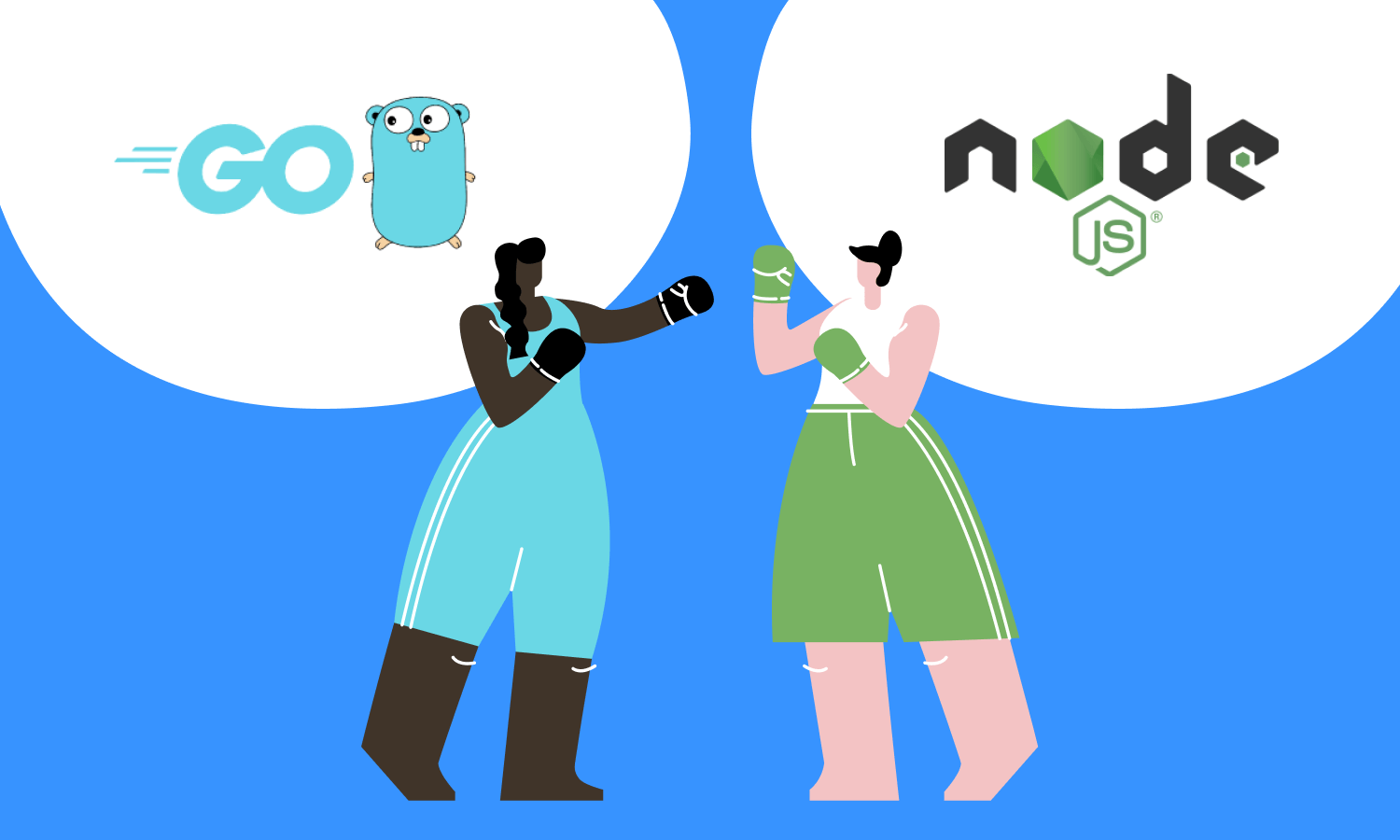Golang vs. Node.js: Quick Comparison and Defining the Best Solution

In the world of back-end programming, Golang and Node.js are trusted and growing technologies, well-known over the planet.
We know Golang as an open-source programming language, while Node.js is an open-source server framework. They both are gaining popularity among the developers for different reasons. They have already been used in outstanding projects. Which one is the best right for you? Let’s consider who will win the battle.
What is Node.js?
Node.js is a server-side open-source runtime environment that was created with a Google Chrome V8 JavaScript engine with the aim to create cross-platform applications. It was introduced in 2009.
Node.js has an async input/output model. It is intended for the development of scalable server-side apps with the JavaScript programming language. Developers are able to utilize the same programming language for backend and frontend, as Node.js engine compiles JavaScript to machine code.
There are many open-source libraries for convenient web application development in Node.js. It can be also integrated with third-party libraries. Node.js is supported by such operating systems as Microsoft Windows, Linux, and MacOS.
What are the key features of NodeJs?
- Asynchronous event handling. The APIs of Node.js library are asynchronous (meaning-blocking). A Node.js based server never relies on API that will bring information back.
- Multi-threaded. Non-blocking is a crucial Node.js feature.
- It assumes that all capacities are designated to the occasion circle and they are (or can be) executed by various strings.
- Object-oriented. NodeJS has a JS legacy that often includes a lot of conceptual spaghetti code. CoffeeScript and TypeScript structures are the solutions.
- Two-way binding. There are sockets that permit a server to communicate messages to all users associated with a particular thread. Thanks to the event-driven non-blocking programming, Node.js unmistakably fits to deal with bindings.
What is Golang?
Golang is Google’s product created in 2007 that is commonly known for being open-source, multi-purpose, and statically-typed. Golang (or just Go) embodies the best characteristics of other programming languages. For example, it combines the speed of Python with the performance and security of C/C++.
Golang is widely used for concurrent programming, providing dynamical interfaces and advanced memory safety. It perfectly suits cloud interfaces, networking apps, and microservices. Go works with Microsoft, Linux, macOS, DragonFly, and others.
What are the features of Golang?
- Speed. Golang is fast thanks to its compiled machine code.
- Standard library. The performance of Go may be proven through a sound library and built-in functions with primitive types.
- Learning capabilities. Golang can be easily learned by web app developers due to its small syntax.
- Garbage collection. The memory management in Golang looks really simple. The garbage collected objects are dynamically allocated while using arithmetic pointers
- Analysis tools.
Node.js vs Golang: Pros and Cons
What are the benefits of using Node.js?
- The powerful technology stack. Nodejs has proven its name by offering too much for developing web apps. Choosing Node.js, developers get advanced free tools and can improve efficiency and developer productivity, performance, and speed as well as team knowledge building.
- Rich ecosystem. There are more than 836K libraries and over 10K published every week in its npm registry.
- Quick processing. Nodejs is proven fast while handling concurrent requests too.
- Corporate support. Among the founding member of Nodejs, we can see such titles as Microsoft, IBM, SAP, PayPal, and others. This fact makes Node.js the best and trustworthy among others.
What about the drawbacks?
- Instability with complex tasks. Unfortunately, Node.js is also known for its powerlessness to process CPU bound errands.
- Callback-hell issue. Node.js backend web development strongly depends on callbacks. Keeping different lined errands out of sight may result in the alleged callback heck that legitimately impacts the nature of code.
- Tooling compatibility. There are many apparatuses in the npm vault which are of low quality or not appropriately archived.
What are the Golang advantages?
- Convenience. Many admit that Golang is prominently easy to use. Its linguistic structure is available to newcomers, and there are no complex capacities to learn.
- Great standard library. The standard library in Golang has no overpowering. It decreases the danger of mistakes from clashing capacity names.
- Security. Simpler code is more secure than confounded code. There is no need to stress over mind-boggling and difficult to distinguish blunders that originate from increasingly powerful languages.
- The power of Google. You will probably not discover a Google competitor in the general search engine tech in the nearest future.
Are there drawbacks?
- No virtual machine. The decision of not combining Golang with a virtual machine is really not a benefit of Golang intended for usability.
- The young age of Go. Golang is still a newcomer and it might lack some pointers in terms of being competitive.
- Oversimplified. This is the case when the benefit may become the greatest shortcoming.
Now let’s take a deeper look at the most vivid characteristics of both solutions.
Node.js vs Go in Action
1. Golang vs Node.js: Maturity
Both languages are known since 2009, both are mature and proven tools with a great support community. However, Node.js has a bigger community.
Node.js O:1 Golang
2. Golang vs Node.js: Performance
Golang is a lightweight and fast solution because it is based on C and C++. It can show high raw performance and established computation processes. Node.js can not give high-speed results and high raw performance of work with CPU and memory (as JavaScript works slower than other programming languages).
Node.js O:2 Golang
3. Golang vs Node.js: Real-life performance
In terms of real-life performance, network communication, or database connection, both Goland and Node.js have the same results and demonstrate the same speed.
Node.js 1:3 Golang
4. Golang vs Node.js: Error handling
Node.js uses throw-catch – a traditional way of error handling (errors are shown and require fixing before developers move to the next stage). Golang provides several ways of error handling for various errors. Node.js looks preferably, as its throw-catch approach is more precise and well-known among developers.
Node.js 2:3 Golang
5. Golang vs Node.js: Learning opportunities
JS comes with tutorials and actively working programming forums. So, having basic knowledge about JavaScript, developers can work with Node.js. Golang doesn’t have a similar prototype. The number of online and offline resources is also not huge. It also makes the Go learning process more complicated.
Node.js 3:3 Golang
6. Golang vs Node.js: Concurrency
Node.js uses an event-callback mechanism and developers can work with a task only in a linear order. It is not about concurrency. Go perfectly suits for huge projects where it is needed to concurrently process a large number of requests.
Node.js 3:4 Golang
7. Golang vs Node.js: Scalability
There are special coroutines called Goroutines in Golang. They provide developers with an opportunity to run functions simultaneously. Goroutines allow Go to be more functional and work with parallel threads with increased productivity. Node.js doesn’t have such functional scalability.
Node.js 3:5 Golang
8. Golang vs Node.js: Development tools
There is a great variety of tools, frameworks, and libraries in Node.js, thanks to JavaScript. Go has also all required packages and libraries for development, but its number is smaller than in Node.js.
Node.js 4:5 Golang
Wrapping up
Golang and Node.js are not totally perfect, they both have strong and weak points. That’s what they are usually used for different sorts of projects.
Node.js presents an open-source environment with robust tools for successful development, it is well-known and easy to learn. Golang is becoming more and more popular, providing high performance and allowing to create powerful projects.
Although both solutions have different characteristics, they are similar in some ways. Analyze them deeply and decide which language to use based on your project’s goals.



